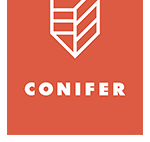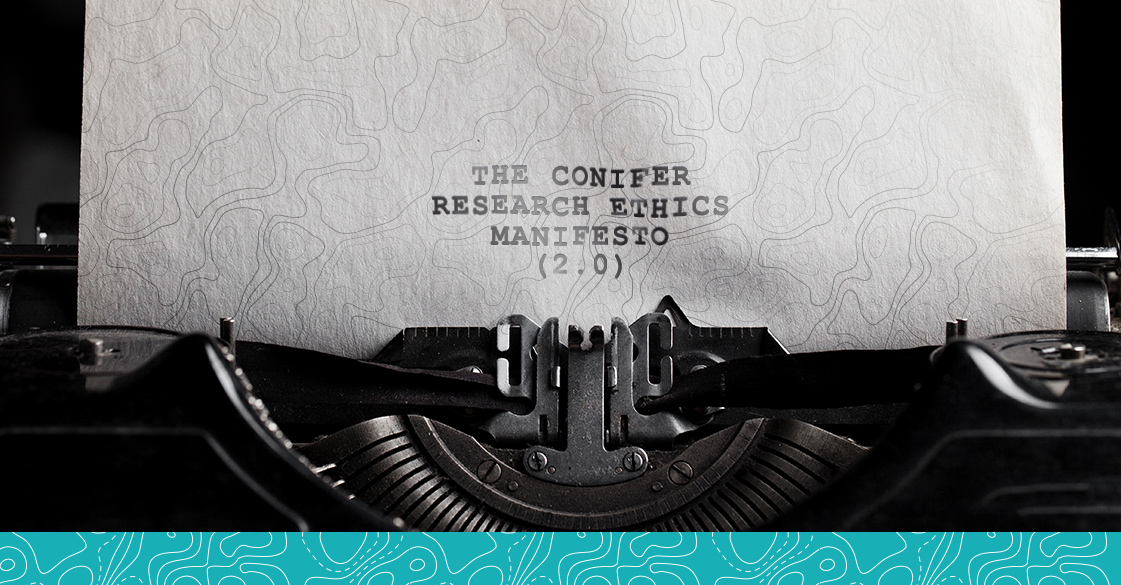
The Conifer Research Ethics Manifesto (2.0)

Our job as researchers and consultants is to interpret and translate parts and pieces of the world for our clients. We then take that understanding and recommend how it might be used to improve said world. Such an objective cannot exist without ethics.
In our research, ethics has generally been focused on the data we collect and the insights that come from our analysis. We are meticulous in protecting the privacy of participants and in reporting findings accurately. These fundamental standards should go without saying. They are codified in laws such as HIPAA and GDPR. Our processes and relationships also necessitate business ethics to protect our clients and research partners by dictating that the learnings, findings, and concepts from a project are confidential. Conifer holds both business and research ethics sacrosanct. We abide by these ethics because it is necessary and right. Moreover, we believe that the ethical responsibility of researchers, and all people involved in innovation, must go further to think critically about the far-reaching impact of their creations and, ultimately, the greater good.
At Conifer, we take pride in getting to the deepest “whys” underlying people’s choices and actions. As our world becomes more interconnected, technologies get smarter, and impacts from these forces more far-reaching, we believe all researchers must become part of the conversation around the “shoulds” and “hows” of innovation.
Below is a statement of Conifer’s beliefs about researchers’ ethical responsibilities. We are calling it our “Ethics Manifesto (2.0)” to highlight that it is an evolution beyond simply focusing on privacy and confidentiality and to emphasize that the complexity of ethics demands that this be a work-in-progress.
At Conifer, we believe it is our ethical responsibility to go beyond mere legal compliance and take a passionate leadership role in ethical innovation.
We believe ethics is more about doing the right thing for the right reasons than just not doing the wrong thing. We think it is crucial to understand how our products and services will benefit us, our customers, and the world in which we live.
We believe the right way for companies to change and innovate should no longer be determined solely by what makes the most money.
We believe companies should address their strategies and practices by taking into full consideration the impact they have on the world and how those decisions and behaviors will contribute to the greater good. Companies should be concerned with ethical sourcing, fair trade practices, greenness, community contributions and engagement, and more.
We believe that innovation ethics requires research and that researchers must embrace ethical questions in their work.
We believe that researchers are positioned and equipped to grapple with the complexity of ethical considerations and impacts. We must help companies reframe their thinking, shifting the focus from individual human experiences of a product or service to contextualizing individual needs within communities, social relations, political and economic structures, the environment, and technological ecosystems.
We must understand consumers’ questions about ethics with the same fervor as we explore price points, pain points, and other aspirations. We must champion an analytical evaluation of our data that describes opportunities to enhance our clients’ ethical stances and practices as brands and corporate citizens.
We all have personal standards for ethical behavior. As consultants, we have the additional responsibility of seeing how our work is applied. Our ethical responsibilities as consultants include making sure our work results in companies making responsible profits by delivering real value to end-users.
We feel an obligation to encourage clients to think about how they can incorporate organizational ethics into their ongoing practices. Organizational ethics should be actively involved at all levels, not just as a box to check for some obscure committee. If conversations about ethics are not happening, it is our responsibility to start them.
We believe customers will increasingly hold companies to higher standards.
We believe that ethical practice delivers value to brands. Attitudinal studies show consumers, especially younger ones, are willing to abandon brands whose actions don’t align with their expectations. They want real demonstrations of company ethics when it comes to sourcing, trade practices, greenness, inclusivity in hiring, paying living wages, and contributing to communities.
We believe that developing ethical practices should be seen as a strategic competency. Customers seeking to hold brands accountable should have their voices amplified, not silenced by research and business practices that avoid these issues. Of course, it is important that products and services make money, but it is also important that they serve the needs of the customer, which are increasingly demanding more than the basic functionality of the product. In return for their loyalty, customers want to know that the company demonstrates its responsible stewardship.
We believe ethics is a continuing series of conversations and practices.
We seek to take on this work with you and all of our clients, as well as our fellow practitioners. We have developed an ethical framework to guide these organizational conversations and inspire our partners, our research, and ourselves.
This is just the beginning, so let’s get to work.

